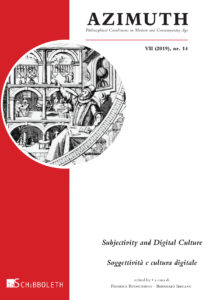 Azimuth 14/2019 | Subjectivity and Digital Culture
Azimuth 14/2019 | Subjectivity and Digital Culture
Edited by Federica Buongiorno, Bernhard Irrgang
ISBN: 9788855290623
Buy Azimuth on Amazon | Buy Azimuth on IBS | Buy Azimuth on Libreriauniversitaria
What role does subjectivity play in digital culture? This question implies a clarification, first, of what exactly we mean by digital culture, and, second, of what a subject is within digital culture. While the 19th century was characterized by print culture and the 20th century by broadcasting culture, we are now experiencing a new paradigm shift: digital technology has radically changed the way we produce (and consume) information, goods, values, social relationships, institutional bonds, etc. The influence of new digital media in contemporary advanced societies, the role played by the Internet and social networking on a global scale, the possibilities disclosed by IT, communication by means of digital tools such as smartphones, tablets, laptops etc., gaming, and GPS technologies – just to name a few: these are all aspects that contribute to the construction of a digital culture in the form of an increasingly virtual, augmented and hyperlinked society. With this issue, our aim is to provide an interdisciplinary overview of the most problematic features of digital culture and the digital self according to contemporary debate, which might suggest new directions for future research and collaborative work.
Contents:
- Preliminary Notes | DOI 10.1400/275004 | http://digital.casalini.it/10.1400/275004
- Bernhard Irrgang, Embedded Human Subjectivity and Digital Self | DOI 10.1400/275005 | http://digital.casalini.it/10.1400/275005
Dennis Weiss, On the Subject of Technology | DOI 10.1400/275006 | http://digital.casalini.it/10.1400/275006 - Constanze Fanger, Knowledge and Autonomy. Changes of Perception in a Digital Culture | DOI 10.1400/275007 | http://digital.casalini.it/10.1400/275007
- Galit Wellner, Digital Subjectivity: From a Network Metaphor to a Layer-Plateau Model | DOI 10.1400/275008 | http://digital.casalini.it/10.1400/275008
- Friederike Frenzel, Can a Map Be Drawn of the Most Internal World? An Attempt to Reclaim the Common Sense | DOI 10.1400/275009 | http://digital.casalini.it/10.1400/275009
- Manja Unger-Büttner, How I Learned to Smile to Robots. On Anthropomorphism, Empathy and Transparent Technology Design | DOI 10.1400/275010 | http://digital.casalini.it/10.1400/275010
- Federica Buongiorno, (Self-)Knowledge Through Numbers? Lifelogging as a Digital Technology of the Self | DOI 10.1400/275011 | http://digital.casalini.it/10.1400/275011
- Andrea Pace Giannotta, Digital World, Lifeworld, and the Phenomenology of Corporeality | DOI 10.1400/275012 | http://digital.casalini.it/10.1400/275012
- Lucilla Guidi, How to do Things with Rules? Heidegger, Wittgenstein and the Case of Algorithms | DOI 10.1400/275013 | http://digital.casalini.it/10.1400/275013
- Mathias Fuchs, Mass Observation | DOI 10.1400/275014 | http://digital.casalini.it/10.1400/275014
- Nadine Reinhardt, “Work” in Progress. Thoughts on the Change of the Concept of Work | DOI 10.1400/275015 | http://digital.casalini.it/10.1400/275015
- Christoph Wulf, The Formation of the Subject in the Digital Culture. Some Considerations, Hypotheses and Research Results Concerning the Education of Young People | DOI 10.1400/275016 | http://digital.casalini.it/10.1400/275016

